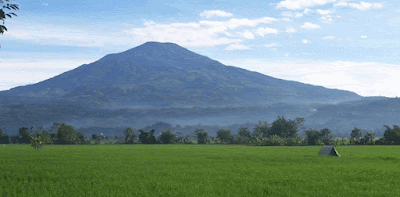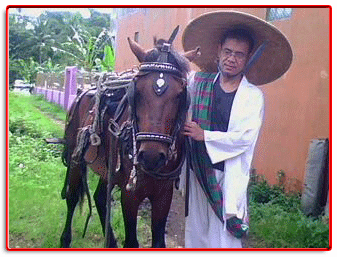Kuningan Regency
Kuningan is a
city in eastern West Java, Indonesia, between Cirebon and Tasikmalaya, about 200 km east of Jakarta. The area is near Mount Cereme/Ciremai (3.078 m), the highest mountain in
West Java. The mountain is located in the western part of the region. The
eastern part is a valley. The city's landmark is a horse, called Kuda Kuningan
and its motto is Kuningan Aman (Safe) Sehat (Healthy) Rindang (Leafy) Indah
(Beautiful) which always be called Kuningan ASRI.
Kuningan
is bordered by Cirebon to the north, Majalengka to the west, Ciamis to the south and Brebes, Central Java to the east. The regency capital is Kuningan
city. Its elevation is 768 metres (2,520 ft) above sea level. The regency's
landscape is one of volcanic mountains, steep terrain, forest, mountains rivers
and fertile agricultural land. The highest mountain in the province, Ciremai
(3,076 m) is located in this regency. There are numerous tropical rainforests
in Kuningan, with such tree species as Pinus (pinus Merkusii), Jati Artocarpus
elasticus (Moraceae), Dysoxylum caulostachyum (Meliaceae), langsat Lansium domesticum
(Meliaceae), and Planchonia valida (Lecythidaceae), being represented.
Ciremai Mountain
Mount Ciremai (3.078 Meter) (or Ciremay)
is a dominating symmetrical star to volcano
in West Java, Indonesia. It
is located to the southwest of the major town of Cirebon. Mt
Ciremai is strikingly visible towards the south from the main west-east (Jakarta-Surabaya) rail
link along the north coast of Java. At the summit of Mt Ciremai there is a 4.5
× 5 km wide caldera. Eruptions are relatively infrequent in historical time
but explosive activity and lahars from the summit have been recorded. Mount Ceremai is especially
significant because it is the highest mountain in the province of West Java. The
name Cereme or Ciremai is derived from Sundanese word for Otaheite gooseberry. There are numerous recreational and
tourist sites on the slopes of Mt Ciremai. Various sites, including parks and
cafes, attract crowds of visitors from Cirebon. The museum at Linggajati on the
slopes of Mt Ceremai which records the important historical event of the Linggardjati Agreement during the struggle for Indonesian
Independence in 1946 attracts many visitors during weekends. The Mt Ciremai National Park extends for a considerable distance
around the slopes of the mountain.
On Mount Ciremai, as on many other
mountains up and down Java, there has been serious deforestation in recent
decades. It was reported in late 2012 that forest destruction on Mt Ciremai had
reached 4,000 ha out of a total of 15,000 ha. Causes are said to include
illegal logging, sand quarrying (often for construction purposes in nearby
areas), and forest fires.[2] Some
of the consequences of deforestation of this kind, evident in the Cirebon area
close to the sea near Mt Ciremai, include extensive siltation of the rivers
which flow northwards into the Java sea and more frequent flooding in lowland
areas.
Mt. Ciremai with
3,078 m high is West Java's tallest mountain and is still an active volcano;
the barren upper part of its cone bears witness to recent eruptions, the last
being in 1805.The climb, starting from either Cipari or Linggarjati, is
strenuous and takes about eight hours, the descent five hours. It seems to be
advisable to climb from Apui on the western flank and descend to Linggarjati.
The crater rim is sometimes so narrow that you cannot walk on it but have to
detour through the thicket. Junghuhn reported in the 19th century that the
Javanese used to hunt rhinos here by placing sharp blades in their paths
through the bush.
Linggarjati
Linggarjati, a
village in Kuningan Region at the foot of Mount Ciremai (3,078 m from sea
level) is place to go for those interested in the history of Indonesian
Independence. This was where the negotiations between the Dutch and Indonesian
was held after independence in August 17, 1945. The house, which was a former
hotel owned by a Dutch entrepreneur, where the Linggarjati agreement was
signed, has undergone renovation and is preserved as historical building.
Photos taken during the negotiation and the signing of the agreement decorate
it’s walls.
Linggarjati is also
a good starting point for mountain climbers. The Ciremai Mountain is the
highest mountain in West Java and beautiful views. This has wild animals such
as Java Tigers and Snakes. Also Kuningan Regency famous with “Kuda Kecil” (The
Little Horse) as Kuningan Regency Symbol, known “Kecil-kecil Kuda Kuningan”. The horses here are littles but also strongs.
Sangkan Hurip
Sangkan Hurip,
opposite the junction of the road to Linggarjati is a hot spring resort in this
area. The hot-spring is from Ciremai Mountain grounds. And Darma Reservoir near
to the Kuningan City Regency, the way to Tasikmalaya.
The Cave of Bunda Maria
The Cave of Bunda
Maria atau yang disebut “Gua Maria”
terletak di Cisantana Kabupaten Kuningan, Kaki Gunung Ciremai. Disebut Gua
Bunda Maria karena di dalam cekungan bangunan tedapat Patung Bunda Maria,
tempat beribadat dan ziarah kaum nasrani / kristen dengan sebutan “Sawer Rakhmat”. Sebelum mendekati
Patung Gua Bunda Maria, peziarah harus melaksanakan Jalan Salib, kemudian
mendekati 14 perhentian yang menggambarkan “Duka – Sengsara” Yesus. Tempat berdo’a adalah pelataran terbuka di
bukit di kaki Gunung Ciremai. Peziarah mengunjungi Gua Bunda Maria sesuai
dengan keinginan kaum nasrani. Namun kalender tahunan ibadat tetap disamakan
seperti Liturgi, pada bulan Mei dan Oktober, ini dilakukan untuk menghormati
Bunda Maria. Seperti pada umumnya berdo’a dan beribadat pada bulan Mei dan
Oktober, disertai berziarah ke
tempat-tempat suci lainnya. Sama yang dilakukan kaum nasrani di dunia
berkunjung ke “Lourdes”, Gua Bunda Maria terdapat di Francis yang terbesar dan
pertama.
Cipari
Cipari and
Linggarjati, driving 30 minutes South from Cirebon will get us to Kuningan
area. It has a natural beauty of it’s own and a cooler climate. Spots to go
includes Cipari, where pre-historic site was found from which items are
displayed in a small museum there.
Seren Taun
Each
year, the Seren Taun ceremony is held in Cigugur, in the foothills south of the
port city, to honor Dewi Sri, the goddess of the paddy. The area around Cigugur
has an assortment of holiday resorts and a modest archaeological park.Far from
the sophistication of modern metropolitan cities, hundreds of people have
turned up for the Seren Taun festival procession in the small Cigugur
village in Kuningan regency, West Java.Held in the 12th month of the Sundanese
calendar, that this year fell on Feb. 2, the thanksgiving festival marked the
end of harvest season and the beginning of a new year. The event culminated on
Wednesday with the ngajayak dance, a procession to welcome farmers. The
event was also used by local farmers to show off agricultural products as well
as other attractions. The festival attracted visitors from outside the regency,
including former president Abdurrahman Wahid, Minister of Trade Andung A.
Nitimihardja, as well as representatives from the Surakarta royal families and
leaders of local communities from across the country.
An elder of the Sundanese Cigugur
community, Prince Djatikusumah, said the Seren Taun festival was meant
to demonstrate farmers' gratitude for a good harvest. “The Seren Taun
festival reflects Sundanese farmers' gratitude to God for the blessings that we
received and hope for good a harvest in the coming year”. The festival is rich
in human values, social solidarity as well as reflecting the strong work ethos
of the farming community. The Seren Taun festival is not a merely an
attraction but also reflects how people should always feel grateful to the
Creator who gives us generous blessings.
Located at the foot of Mt. Ceremai in
West Java, the village is renowned as a model of religious harmony where
Muslims, Christians and those of other faiths have long lived together in
peace. Seren Taun reflects the people's religious and cultural values,
passed on from generation to generation. The festival could be further
developed to support tourism. Wednesday's opening procession was continued with
three colossal performances - the Buyung dance, and Angklung Baduy
and Angklung Buncis musical performances - which were performed by
members of the community coming from different religions and faiths. After the
performances, the event ended with a procession. Rice paddy was given to the
people by the community leaders, who then pounded it together.
Darma Lake
This is an
artificial reservoir called Waduk Darma or Lake Darma after the nearest
village. It makes for a good stopover and place for a family picnic. Waduk
Darma is a dam with 425 Ha in large and 39.000.000m3 water capacity. Besides
functioned as a dam, Waduk Darma also nice place for recreation purpose and it
has a magnificent sunset view. The glory of sunset over Waduk Darma will be
adding your enhancement experience.Just after passing the dam, turn right into
the recreation grounds, where a small admission fee is charged. To makes your
gratify vacation a few motor boats offer one hour ride around the lake.
=====o0o=====




















